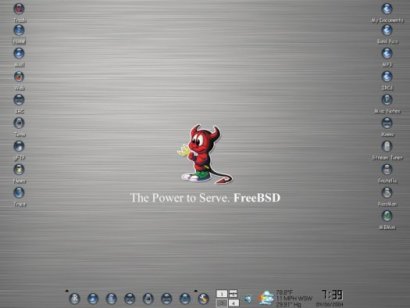 De leden van Freebsd Release Engineering Team hebben vandaag dan eindelijk versie 7.0 van Freebsd uitgebracht. Freebsd is in 1993 ontstaan en wordt als besturingssysteem in zijn geheel ontwikkeld. Dit in tegenstelling tot bijvoorbeeld Linux, waar de kernel door de ene groep ontwikkelaars wordt onderhouden en bepaalde applicaties weer door anderen. Hierdoor wordt Freebsd over het algemeen als stabieler en robuuster beschouwd dan andere besturingssystemen. Versie 7.0 brengt een hoop veranderingen met zich mee, waaronder een sterk verbeterde performance, ondersteuning voor het zfs-bestandssysteem van Sun en verbeterde ondersteuning voor draadloze netwerken. Hieronder is het overzicht van de belangrijkste veranderingen in deze release te vinden:
De leden van Freebsd Release Engineering Team hebben vandaag dan eindelijk versie 7.0 van Freebsd uitgebracht. Freebsd is in 1993 ontstaan en wordt als besturingssysteem in zijn geheel ontwikkeld. Dit in tegenstelling tot bijvoorbeeld Linux, waar de kernel door de ene groep ontwikkelaars wordt onderhouden en bepaalde applicaties weer door anderen. Hierdoor wordt Freebsd over het algemeen als stabieler en robuuster beschouwd dan andere besturingssystemen. Versie 7.0 brengt een hoop veranderingen met zich mee, waaronder een sterk verbeterde performance, ondersteuning voor het zfs-bestandssysteem van Sun en verbeterde ondersteuning voor draadloze netwerken. Hieronder is het overzicht van de belangrijkste veranderingen in deze release te vinden:
Some of the highlights of this release:[break]
- Dramatic improvements in performance and SMP scalability shown by various database and other benchmarks, in some cases showing peak performance improvements as high as 350% over FreeBSD 6.X under normal loads and 1500% at high loads. When compared with the best performing Linux kernel (2.6.22 or 2.6.24) performance is 15% better. Results are from benchmarks used to analyze and improve system performance, results with your specific work load may vary. Some of the changes that contribute to this improvement are:
- The 1:1 libthr threading model is now the default.
- Finer-grained IPC, networking, and scheduler locking.
- A major focus on optimizing the SMP architecture that was put in place during the 5.x and 6.x branches.
- Some benchmarks show linear scaling up to 8 CPUs. Many workloads see a significant performance improvement with multicore systems.
- The ULE scheduler is vastly improved, providing improved performance and interactive response (the 4BSD scheduler is still the default for 7.0 but ULE may become the default for 7.1).
- Experimental support for Sun's ZFS filesystem.
- gjournal can be used to set up journaled filesystems, gvirstor can be used as a virtualized storage provider.
- Read-only support for the XFS filesystem.
- The unionfs filesystem has been fixed.
- iSCSI initiator.
- TSO and LRO support for some network drivers.
- Experimental SCTP (Stream Control Transmission Protocol) support (FreeBSD's being the reference implementation).
- Much improved wireless (802.11) support.
- Network link aggregation/trunking (lagg(4)) imported from OpenBSD.
- JIT compilation to turn BPF into native code, improving packet capture performance.
- Much improved support for embedded system development for boards based on the ARM architecture.
- jemalloc, a new and highly scalable user-level memory allocator.
- freebsd-update(8) provides officially supported binary upgrades to new releases in addition to security fixes and errata patches.
- X.Org 7.3, KDE 3.5.8, GNOME 2.20.2.
- GNU C compiler 4.2.1.
- BIND 9.4.2.


:fill(white):strip_exif()/i/2006248674.jpeg?f=thumbmedium)